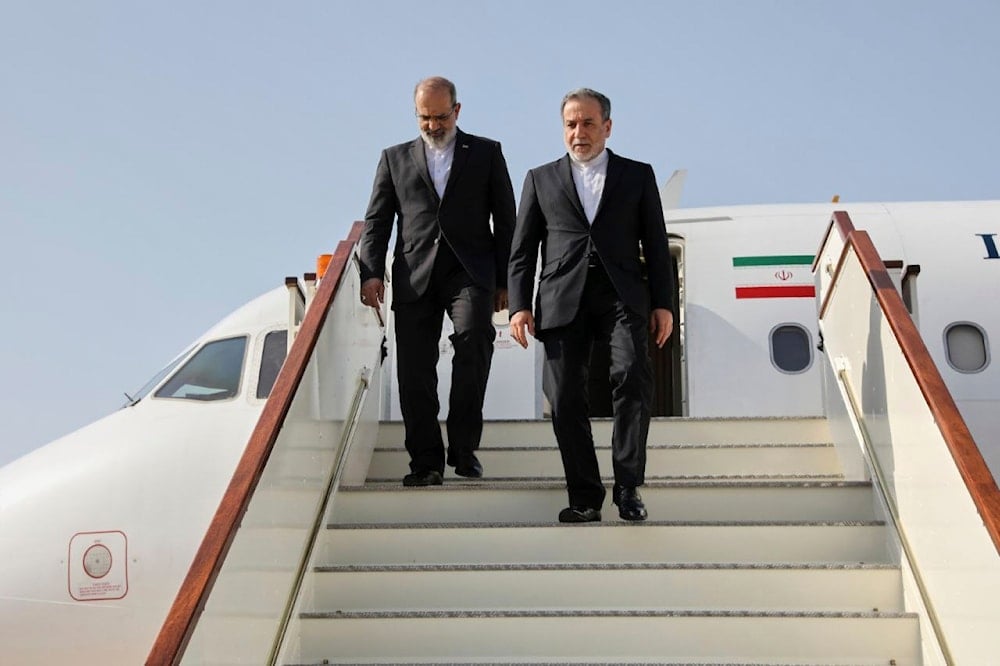Iran no longer benefits from reviving the 2015 nuclear deal: Araghchi
Iranian Foreign Minister Abbas Araghchi says the 2015 JCPOA no longer serves Tehran's interests, expressing readiness for a new nuclear deal as US-Iran talks enter their fifth round.
-

Iranian Foreign Minister Abbas Araghchi, steps out from his plane as he arrives at Muscat, Oman, Friday, April 25, 2025, a day prior to negotiations with US Mideast envoy Steve Witkoff. (AP)
The Iranian Foreign Minister Abbas Araghchi stated that reviving the 2015 JCPOA agreement with the United States no longer serves Iran's interests, emphasizing Tehran's readiness to ink a new deal as the US-Iran talks enter their fifth round.
"Numerous sanctions have been imposed on Iran over the past years, yet in terms of nuclear technology, we have made significant progress, unlike anything comparable to the state of our nuclear program before the agreement," Araghchi said.
The Iranian foreign minister emphasized Tehran’s willingness to take steps to reassure international partners of its nuclear program’s peaceful intentions, including accepting temporary technical restrictions, in exchange for sanctions relief.
"With this framework, we can reach a new nuclear deal," Araghchi emphasized.
Araghchi made clear that Tehran will not give up its legitimate rights and insisted that uranium enrichment must continue. However, he expressed willingness to allow expanded oversight and monitoring of Iran’s nuclear facilities, provided no measures violating international norms and laws are imposed.
Meanwhile, US Department of State spokesperson Tammy Bruce stated that the fifth round of Iran-US talks would not be set to take place if the US didn't think there would be a positive outcome.
US Secretary of State Tammy Bruce stated that the fifth round of nuclear negotiations would never have been set without a genuine belief in progress and the chance of success, emphasizing that Iran acquiring a nuclear weapon is out of the question, and uranium enrichment cannot be permitted. Bruce highlighted that this is precisely why maintaining these talks is so critical.
Fifth round of Iran-US talks to take place on May 23
Omani Foreign Minister Badr bin Hamad Al Busaidi confirmed Wednesday that Iran and the United States will resume indirect nuclear negotiations on May 23 in Rome, marking the fifth round of Oman-mediated backchannel diplomacy aimed at easing long-standing tensions over Iran's nuclear activities.
Iranian Deputy Foreign Minister Kazem Gharibabadi stated on Tuesday that Tehran was evaluating a recently received proposal regarding upcoming indirect negotiations with the United States.
Ongoing discussions continue to be affected by the unresolved dispute regarding uranium enrichment. Washington is maintaining its demand for Iran to halt such activities due to concerns they could lead to nuclear weapons development. Meanwhile, Tehran persistently counters these claims by asserting the exclusively peaceful nature of its nuclear program and emphasizing its legal entitlements under the Non-Proliferation Treaty (NPT).
Iran vows retaliation for Israeli nuclear threats
Amid the Iran-US talks, US media reports citing intelligence suggest "Israel" may be preparing a military strike on Iranian nuclear sites, with CNN reporting that American officials have warned such action could not only represent a dangerous break from previous US policy but also risk triggering a broader regional conflict.
In a formal letter to the United Nations, Iranian Foreign Minister Abbas Araghchi delivered a stern warning regarding potential Israeli attacks on Iran’s nuclear facilities, declaring that Tehran would respond decisively to any such aggression while explicitly stating that the United States would bear legal responsibility for any resulting escalation.
Araghchi emphasized that in the event of such a strike occurring, the United States would bear unavoidable responsibility, arguing that Washington's consistent political and military backing of "Israel" establishes clear complicity in any potential aggressive actions.
Echoing the foreign ministry's position, the Iranian Parliament simultaneously reinforced Tehran's unwavering stance on preserving its nuclear rights as lawmakers emphasized the nation's continued adherence to the Treaty on the Non-Proliferation of Nuclear Weapons (NPT) and its consistent rejection of nuclear weapons development.

 4 Min Read
4 Min Read









